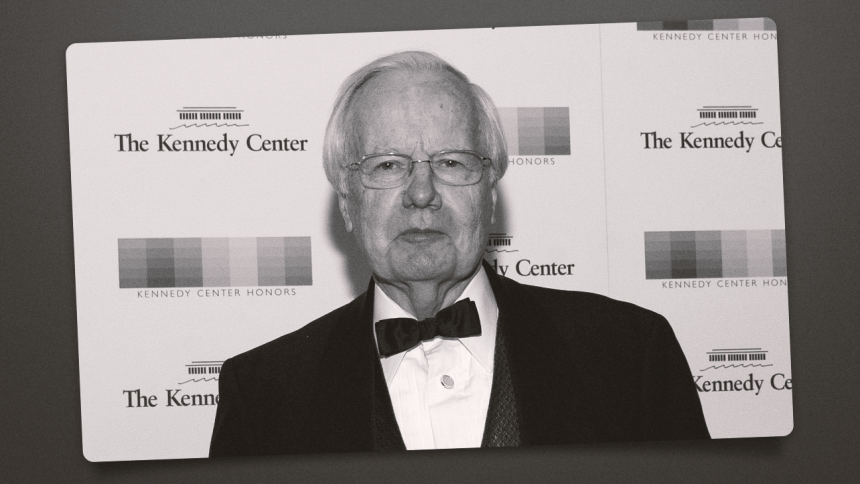Bill Moyers, Longtime PBS and CBS Journalist and Documentarian, Dies at 91
Bill Moyers, the onetime White House Press Secretary and newspaper publisher who spent four decades as a respected broadcast journalist and documentarian for PBS and CBS, died Thursday. He was 91.
Moyers died at Memorial Sloan Kettering Cancer Center in New York after a long illness, his son William told the Associated Press.
Moyers hosted, wrote for and/or produced PBS programs like Bill Moyers’ Journal, Moyers & Company, A World of Ideas, Frontline, Now With Bill Moyers, Creativity With Bill Moyers and A Walk Through the 20th Century in stretches from 1971 through 2010, winning two Peabody Awards, three Humanitas Prizes and four Primetime Emmys along the way.
An eloquent speaker with a soft Texas twang, he was a skillful longform interviewer who confronted social and political issues with incisive, folksy exploration. He was not afraid to state his point of view and supported liberal causes and organizations, including Fairness and Accuracy in Reporting and Take Back America.
You Might Also Like
“In an age of television shouters, Mr. Moyers is an anomaly,” David Carr wrote for The New York Times in 2004. “His delivery is measured and the rhetoric temperate. Yet he used the tools of the documentarian to wield a velvet sledgehammer, bludgeoning corporate polluters and government ne’er-do-wells with precision and grace. His tendentiousness in choice of targets has earned him the fealty of public television audiences and the enmity of conservative observers.”
In 1976, Moyers exited PBS to become editor and chief correspondent for CBS Reports. He also did On the Road mini-documentaries as well as analysis and commentary for the CBS Evening News With Dan Rather starting in 1981, drawing a salary of $1 million a year.
In a bitter split, Moyers exited CBS in 1986 — he said the line between entertainment and news at the network had “steadily blurred” — and formed his own company, Public Affairs Television, to distribute his programs. Transcribed versions were published as books, including Joseph Campbell and the Power of Myth, which remained on the Times‘ best-seller list for more than a year.
Moyers was hailed by some as “the conscience of America,” a trusted public figure in the mold of Walter Cronkite. He was considered a possible Democratic Party presidential candidate but never took the bait.
In 2006, he received a Lifetime Achievement Emmy from the National Academy of Television Arts & Sciences for “devoting his lifetime to the exploration of the major issues and ideas of our time and our country, giving television viewers an informed perspective on political and societal concerns.”
The youngest of two sons, Billy Don Moyers was born on June 5, 1934, in Hugo, Oklahoma. His father, Henry, was a truck driver and his mother, Ruby, a housewife.
Raised in Marshall, Texas, he began his journalism career as a cub reporter on the Marshall News Messenger and was the editor of the sports page while still a sophomore at Marshall High School.
At North Texas State College, he spent the summer of 1954 interning for Lyndon B. Johnson in Washington, getting the job after writing an “audacious” letter to the Texas senator. “I said to him, ‘I can tell you something about young people in Texas if you can tell me something about politics,’” he recalled in a 2001 chat for the Television Academy Foundation website The Interviews.
Moyers graduated from the University of Texas with a degree in journalism in 1956. As a student in Austin, he also worked at KTBC-TV, a station owned by Johnson’s wife, Lady Bird Johnson. He then studied in Scotland for a year before attending Southwestern Baptist Theological Seminary in Fort Worth, landing a Master of Divinity degree in 1960. (He officiated the wedding of George Lucas and Mellody Hobson at Skywalker Ranch in 2013.)
Moyers rejoined Lyndon Johnson, soon to be John F. Kennedy’s pick for vice president, as his “Man Friday” during the 1960 presidential campaign. He helped create the Peace Corps during the JFK administration in March 1961, reporting to the president’s brother-in-law, Sargent Shriver, as deputy director.
When Johnson became president after Kennedy’s assassination, Moyers stayed on as his adviser and special assistant. He was highly involved in Johnson’s 1964 re-election campaign against Republican Barry Goldwater and approved the controversial “Daisy” TV commercial in which a girl counts the petals she plucks from a flower before another countdown leads to a nuclear explosion on the screen.
“It never mentioned Goldwater, it wasn’t a personal attack,” Moyers said in his TV Archive interview. “It was an assertion of concern over whose hand was on the nuclear trigger. It was a subliminal ad, though I didn’t even know the meaning of that term then. [Goldwater] never forgave me for what he understood was my role in it, right up until the end of his life.”
After Johnson’s landslide triumph, Moyers served as White House Press Secretary from 1965-67 — a media darling, he was on the covers of Time and Newsweek during his first year on the job — before resigning to become publisher of Newsday in 1967.
The Long Island newspaper hired columnist Pete Hamill and won two Pulitzer Prizes during his three-year tenure, which ended when Newsday was sold to the Times Mirror Co. (Moyers had put together a higher offer to buy the paper but was rebuffed.)
He then traveled around the country for Harper’s magazine for four months in a “swing of rediscovery,” from which he wrote 1971’s Listening to America, which became a best-seller.
From that, New York public TV station WNET hired him to host a weekly half-hour that would become Bill Moyers’ Journal. The program included the first major interview with Jimmy Carter before he was known outside of Plains, Georgia, as well as an acclaimed “Essay on Watergate” in 1973.
Moyers had a “five years and out” philosophy, considering that for people to “renew” themselves, they should move on every five years. That philosophy originated when he persuaded Congress to make that period of time the maximum for volunteer employment in the Peace Corps.
He held that policy for public broadcasting, too. “It’s very important for [it] to open itself constantly to new people, to renew it,” he said. “And that’s not going to happen unless us old-timers move on.”
He also worked for NBC and MSNBC in the mid-1990s.
Moyers married North Texas State classmate Judith Davidson in December 1954 — she went on to serve as president of Public Affairs Television — and they had three children, William, John and Alice.







